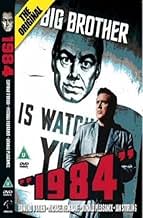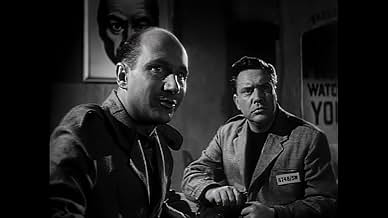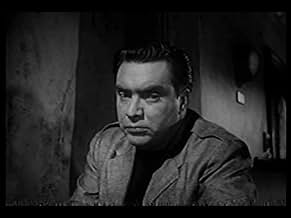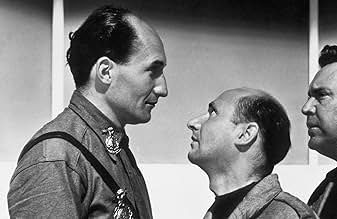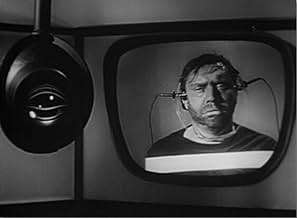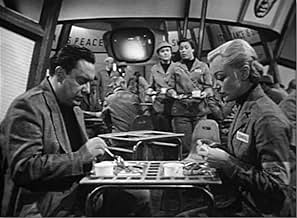NOTE IMDb
6,9/10
4,6 k
MA NOTE
Ajouter une intrigue dans votre langueIn a totalitarian future society, Winston Smith, whose daily work is re-writing history, tries to rebel by falling in love.In a totalitarian future society, Winston Smith, whose daily work is re-writing history, tries to rebel by falling in love.In a totalitarian future society, Winston Smith, whose daily work is re-writing history, tries to rebel by falling in love.
- Réalisation
- Scénario
- Casting principal
Donald Pleasence
- R. Parsons
- (as Donald Pleasance)
Kenneth Griffith
- Prisoner
- (as Kenneth Griffiths)
Barbara Cavan
- Woman
- (voix)
- (non crédité)
Walter Gotell
- Guard
- (non crédité)
Anthony Jacobs
- Telescreen
- (voix)
- (non crédité)
Barbara Keogh
- Special Woman
- (non crédité)
Bernard Rebel
- Kalador
- (non crédité)
Avis à la une
This is a relatively faithful rendering of one of the novels that I remember from my youth. All the high school kids (who read anything) were reading it and talking about it. This was in the early sixties. I could not put the book down as terrifying and depressing as it was. All elements of society were controlled by the leaders. It brings to mind modern North Korea where the citizens are clueless and fed jingoistic nonsense. Winston Smith is a worker who has an intellectual side. He begins, through connections with others, to see that there is something wrong with the way he and his fellows are treated. Everything is controlled. He is ill and every day is like the last. Big Brother is looking out for everyone. He's probably not a real person, but they don't know. Winston meets Julia and they start to have a relationship. We know where this is going. As bad as things are, the producers don't get into some of the even more oppressive business of the government. Not a story for the squeamish.
Good, and I do really mean GOOD, dystopian Sci-Fi is the only (sub-) genre in cinema that occasionally manages to frighten me or make me feel uncomfortable. Titles such as "Soylent Green", "Z. P. G", or the more recent "Children of Men" are deeply disturbing not because we will be battling alien races or intelligent robots in the not-so-distant future, but because mankind itself made the planet unlivable. George Orwell, and his uniquely magnificent novel "1984", is probably the founding father of dystopian SciFi (although the influence of "Metropolis" is also unneglectable) and it's still one of the most horrifying tales ever written as far as I'm concerned.
Admittedly "1984" didn't turn out to be the phenomenal movie I secretly hoped it would be. It's an engaging, competently made, and absorbing transfer of Orwell's totalitarian nightmare from paper to screen, but some things are missing. I just didn't feel it. I didn't feel Big Brother's eyes penetrating in my back, I didn't feel the Inner Party's tyrannical madness, or their greed to own and control every human being's life. I didn't feel Winston and Julia's desperate desire to live in complete freedom. Perhaps the year of release, 1956, was still a bit too early to turn the novel into a motion picture. Director Michael Anderson somewhat fails to recreate the bleak and depressing atmosphere, as well as the dauntingly monotonous set-pieces, of a truly miserable dystopian world. 20 years later, however, Anderson would prove himself certainly capable of doing so with "Logan's Run". The 70s were just the ideal decade for dystopian Sci-Fi.
Of course, I would like to finish by underlining that "1984" is nevertheless a very good film, and worth tracking down for fans of the Sci-Fi genre, as well as George Orwell admirers. Several aspects are fantastic, notably the strong performances of the emotional Jan Sterling and the stoic Michael Redgrave. There are a handful effectively disturbing highlights as well, like the inspection rituals Winston has to endure in his own apartment, the public promoting of events like "hate-week" or the persona of young Selena Parsons, who has been so completely indoctrinated by Big Brother that she even becomes terrifying to her own neighbor and father (the stupendous Donald Pleasance in an early role).
Admittedly "1984" didn't turn out to be the phenomenal movie I secretly hoped it would be. It's an engaging, competently made, and absorbing transfer of Orwell's totalitarian nightmare from paper to screen, but some things are missing. I just didn't feel it. I didn't feel Big Brother's eyes penetrating in my back, I didn't feel the Inner Party's tyrannical madness, or their greed to own and control every human being's life. I didn't feel Winston and Julia's desperate desire to live in complete freedom. Perhaps the year of release, 1956, was still a bit too early to turn the novel into a motion picture. Director Michael Anderson somewhat fails to recreate the bleak and depressing atmosphere, as well as the dauntingly monotonous set-pieces, of a truly miserable dystopian world. 20 years later, however, Anderson would prove himself certainly capable of doing so with "Logan's Run". The 70s were just the ideal decade for dystopian Sci-Fi.
Of course, I would like to finish by underlining that "1984" is nevertheless a very good film, and worth tracking down for fans of the Sci-Fi genre, as well as George Orwell admirers. Several aspects are fantastic, notably the strong performances of the emotional Jan Sterling and the stoic Michael Redgrave. There are a handful effectively disturbing highlights as well, like the inspection rituals Winston has to endure in his own apartment, the public promoting of events like "hate-week" or the persona of young Selena Parsons, who has been so completely indoctrinated by Big Brother that she even becomes terrifying to her own neighbor and father (the stupendous Donald Pleasance in an early role).
10bux
Dingy, atmospheric version of George Orwells tale concerning two citizens of the New World Order involved in illicit, illegal love. Nothing is pretty in this story, and perhaps O'Brian and Sterling are a bit long in the tooth for the characters the author had in mind, however the superb dramatizations overcome any casting mishaps. The story of life in a totalitarian society rings chillingly familiar today. And, in the conclusion, to quote the poet laureate of our times, Todd Rundgren "Winston Smith Takes it on the Jaw Again!"
The destruction of love is what we see here effectivly in all aspects of society.
the destruction of the family , an enemy that is artificial , control of the history .
It is scary and maybe far more nearby to us now than ever before because some aspects are now pretty actual in this so called crisis , like fear for eachother and isolation from another .
I saw this movie as a young boy,and at the time I was very naive as to what they meant by "Big Brother" Many people to day, in particular the young, do not know the real meaning to Big Brother. Another name for it is the "New World Order" As in the Bible,you will have a noticeable stamp on your body in order to buy food or what have you. And your whereabouts will be monitored. And for this reason, I've NEVER forgotten this movie. It's a must see film by those that are as naive as I was,when I was a young boy.
Le saviez-vous
- AnecdotesSonia Orwell, widow of George Orwell, objected to the changed ending, and had this movie withdrawn from circulation.
- Citations
O'Connor of the Inner Party: You will be hollow. We will squeeze you empty and fill you with ourselves, with love of Big Brother.
- Versions alternativesThere are two endings to this film. The UK version ends with a defiant Winston Smith and Julia being executed by the authorities. The US version is more faithful to Orwell's book and concludes with Winston and Julia being brainwashed into becoming loyal followers of "Big Brother."
- ConnexionsFeatured in Hollywood and the Stars: The Angry Screen (1964)
Meilleurs choix
Connectez-vous pour évaluer et suivre la liste de favoris afin de recevoir des recommandations personnalisées
- How long is 1984?Alimenté par Alexa
Détails
- Durée
- 1h 30min(90 min)
- Couleur
Contribuer à cette page
Suggérer une modification ou ajouter du contenu manquant

